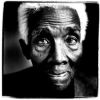C. L. R. James

C. L. R. James
Cyril Lionel Robert James, who sometimes wrote under the pen-name J. R. Johnson, was an Afro-Trinidadian historian, journalist and socialist. His works are influential in various theoretical, social, and historiographical contexts. His work is a staple of subaltern studies, and he figures as a pioneering and influential voice in postcolonial literature. A tireless political activist, James's writing on the Communist International stirred debate in Trotskyist circles, and his history of the Haitian Revolution, The Black Jacobins, is a seminal text...
NationalityTrinidadian
ProfessionJournalist
Date of Birth4 January 1901
It is Toussaint's supreme merit that while he saw European civilisation as a valuable and necessary thing, and strove to lay its foundations among his people, he never had the illusion that it conferred any moral superiority. He knew French, British, and Spanish imperialists for the insatiable gangsters that they were, that there is no oath too sacred for them to break, no crime, deception, treachery, cruelty, destruction of human life and property which they would not commit against those who could not defend themselves.
I may as well say it, I have been married three times.
The antagonisms between men and women express themselves in the most delicate phase of their life together - in their sexual relationship.
Today we ought to be able to see first that Booker T. Washington faced a situation in which he was seeking desperately for a way out, and he could see no way out except capitulation.
This independent Negro movement is able to intervene with terrific force upon the general social and political life of the nation, despite the fact that it is waged under the banner of democratic rights ... [and] is able to exercise a powerful influence upon the revolutionary proletariat, that it has got a great contribution to make to the development of the proletariat in the United States, and that it is in itself a constituent part of the struggle for socialism.
In the last quarter of the eighteenth century bourgeois Europe needed to emancipate itself from that combination of feudalism and commercial capitalism which we know as mercantilism.
In World War II the hostility and the exasperation resulting from the statification of the economy and the strain of the war have been directed as much against the government as against private capital.
One of the surest signs of the estimated changes in the consciousness of the American proletariat is to be found in the character of the demands now being put forward by the leadership.
There can be raw pain and bleeding where so many thousands see the inevitable ups and downs of only a game.
As the class struggle sharpens in the U.S. Marxism will come into its own as a great popular study.
An army is a miniature of the society which produces it.
First of all, Bolshevism represents revolution and the revolutionary struggle.
The race question is subsidiary to the class question in politics, and to think of imperialism in terms of race is disastrous. But to neglect the racial factor as merely incidental is an error only less grave than to make it fundamental.
The struggle for socialism is the struggle for proletarian (working class) democracy. Proletarian democracy is not the crown of socialism. Socialism is the result of proletarian democracy. To the degree that the proletariat mobilizes itself and the great masses of the people, the socialist revolution is advanced. The proletariat mobilizes itself as a self-acting force through its own committees, unions, parties, and other organizations.